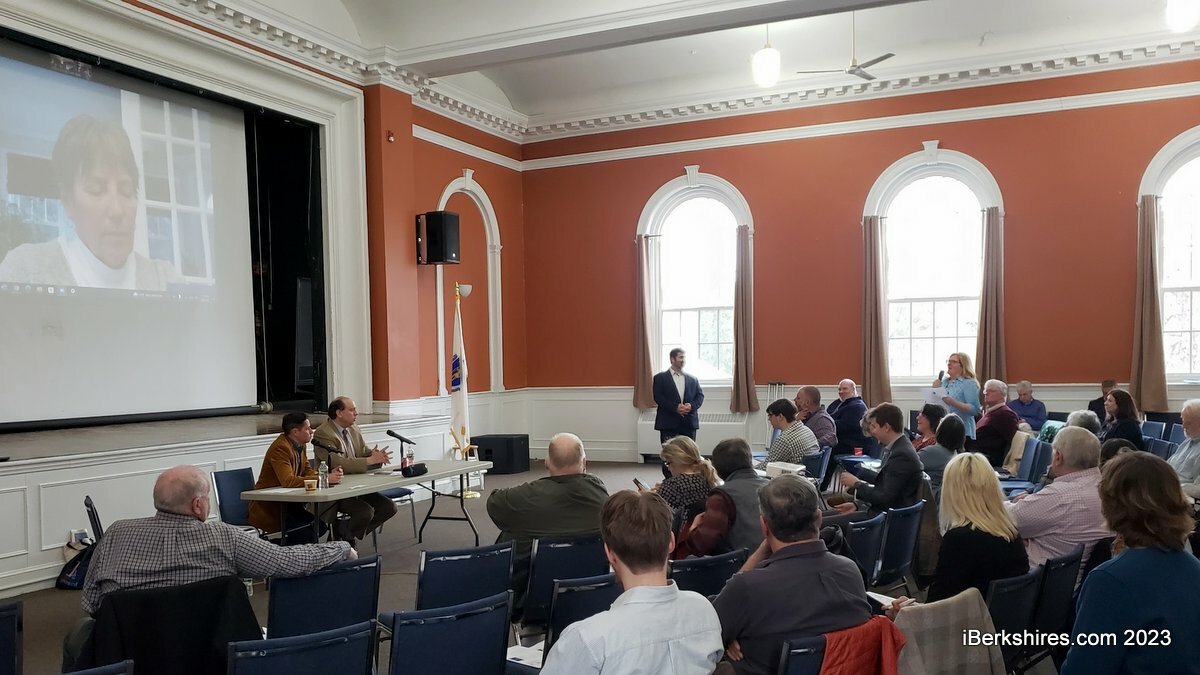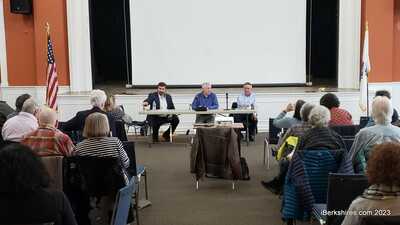State Senators Hear About Needs of Rural CommunitiesBy Tammy Daniels, iBerkshires Staff
08:05AM / Sunday, March 26, 2023 | |
 State Sen. Paul Mark, standing, moderates questions for state Sens. Anne Gobi of Spencer (on screen), Jake Oliveira of Ludlow and Jamie Eldridge of Acton. They are chairs of the Joint Committees on Tourism, Agriculture, Municipalities and Regional Government, and the Judiciary, respectively. State Sen. Paul Mark, standing, moderates questions for state Sens. Anne Gobi of Spencer (on screen), Jake Oliveira of Ludlow and Jamie Eldridge of Acton. They are chairs of the Joint Committees on Tourism, Agriculture, Municipalities and Regional Government, and the Judiciary, respectively. |
 | | Sen. Paul Mark with colleagues John Keenan of Quincy and Michael J. Rodrigues of Westport, chairs of the Joint Committees on Transportation and Ways and Means. The event ran from about 9 to 1:30 at Lenox Town Hall. |
LENOX, Mass. — Decrepit buildings, deteriorating roads, swelling budgets, few staff and dwindling resources.
These and other issues challenging rural communities were brought to the fore as local officials tried catch the ears of legislators and strategize ways to advocate for their needs on Beacon Hill.
On Friday morning, more than a dozen administrators, selectmen and councilors had gathered at the GAR Memorial Hall in Adams to provide input to Massachusetts Municipal Association representatives on legislative actions.
And on Saturday, dozens more from Berkshire, Hampden and Hampshire counties were at Lenox Town Hall for state Sen. Paul Mark's "Beacon Hill in the Berkshires" featuring chairs of Senate committees and State Auditor Diana DiZoglio.
Mark, a former representative, was elected senator of the far-flung Western Mass district last fall. He thanked his colleagues for coming to the Berkshires and local officials for taking advantage of the opportunity to speak with them directly.
His constituents called for more unrestricted general government aid, more resources for rural schools and a recognition that the benefits of grant programs aren't equal across communities.
Small towns often don't have the capacity to apply for, manage or qualify for grants, said Washington Select Board Chair Kent Lew, "they don't do us as much good in small towns as good old-fashioned, unrestricted government aid."
Small-town budgets are eaten up uncontrollable assessments with few options for raising revenues outside of property taxes, he said. "It's becoming unsustainable."
North County officials at Friday's MMA legislative meeting heard about the advocacy planned for this session, including pushing for a more than 6 percent increase in unrestricted aid to bring the account up to $1.3 billion and index Chapter 90 road funds to inflation. Some 24 bills in all have been filed by the municipal association.
The state consensus revenue forecast is 1.6 percent for fiscal 2024, but MMA reps noted that year-to-date revenues are nearly 5 percent over this time last year — and that doesn't include the 4 percent surtax, or Fair Share Amendment, passed by voters last fall.
State aid was dramatically reduced in the wave of the Global Economic Collapse in 2008 and has yet to recover. MMA points out that even at 2 percent, the level of unrestricted aid would still be 4.5 percent below 2008.
State Sen. Michael J. Rodrigues, Senate chair of the Joint Committee on Ways and Means, on Saturday noted that the governor's budget had pegged a 2 percent increase for unrestricted aid, saying, "I think we can do better than that."
But he also acknowledged that inflation is taking large bites out budgets.
Rural communities are hoping for more — more in school funding and more in road funding.
The House passed a bill adding another $150 million in transportation related grants to Gov. Maura Healey's $200 million for Chapter 90 in each of the next two years. The MMA is asking for $330 million a year and indexing Chapter 90 to inflation.
Western Mass communities for years have said the amount of Chapter 90 funding they get does not keep up with the road repairs or inflation, especially in small towns that have miles of roads and minimal tax bases.
Becket Town Administrator Katherine A. Warden pointed to a road project likely to exceed $1 million while the town only gets $235,000 in Chapter 90 each year. She invited the lawmakers to take a ride on her town's gravel roads that — with 36 inches of snow last week — aren't just entering mud season but "lose your truck in the mud season."
"We need our infrastructure. I'm all for parks and the Ashuwillticook Rail Trail. I'm glad we have it, but when I see they're getting money to continue it and I'm still getting $235,000 for roads, there's a problem there," Warden said. "We have to balance our needs with our wants at this end of the state — our needs are outsurpassing our wants."
A Mount Washington Select Board member said his town gets $70,000 in Chapter 90 a year and a recent bid for a section of paving came in at $360,000. "These formulas aren't working for communities out here," he said.
They're also asking for an increase in the maximum awards for MassWorks grants that currently top out at $1 million. Nowadays, that's barely a mile of road.
Goshen's Select Board Chair Angela Otis says she's got $250,000 highway trucks that can't fit into her undersized and outdated 75-year-old highway garage. It needs to replaced but doesn't really fit into the state's Commonwealth Places grant program.
"I know that that's where I need to put my $3.8 million. I would like some support from the state to do that. We're not talking about putting in a swimming pool," she said. "It's ridiculous. We know we need the money for that. I don't need Commonwealth Places today. I need a garage."
Lisa Blackmer, president of the North Adams City Council, pointed out the city's aged and deteriorating public safety complex has been under U.S. Department of Justice consent decree.
"I say if the feds are after us, we should move to the top of the list," she said.
There's been some support for a capital building authority, similar to the Massachusetts School Building Authority and its one of 24 bills filed by the MMA.
Another challenge for communities is land conservation through any of the state programs or in purchase by nonprofits. The state owns half or more of some towns and their payment in lieu of taxes, or PILOTs, have lagged for years behind that for urban facilities.
Otis said she recognized the value in saving land but that the state should also recognize it has value and a Worthington Select Board member said "massive amounts" of that town's land are under Agricultural Preservation Restrictions. This affects the town's ability to raise revenue through taxation.
New Marlborough Select Board Chair Mark Carson said there's been a sudden shift as second-home owners began buying up land and putting it into trusts or under conservation. "I don't know how it got so big and so fast on us," he said.
The participants also spoke about being able to make minor changes in their charters (such as changing "selectmen" to select board) without having to go through the Legislature, more funding for rural schools (while the Rural School Aid Program, of which Sen. Paul Mark had been a proponent has helped, they say it's still not enough; Blackmer, a school business administrator, noted how the budgets of the small schools in her union could be devastated by a single special education placement), transportation needs, and onerous laws that can be inordinately burdensome to small communities.
Lew pointed to the changes in running for office that require filings with the Office of Campaign and Political Finance. Even if the candidate — and there's often only one — spends no money, they have to open a bank account, get a tax number with the IRS and file with the OCPF.
It's hard enough, he said, to get people to essentially volunteer for these positions and this extra effort may be a dissuading factor.
Williamstown Select Board member Andrew Hogeland urged the legislators to ask what effect the laws they were passing would have on small communities.
"It's just been a history of budgets coming out, programs coming out to address housing or highways, whatever it is, and a lot of times the broad impact isn't thought about until afterwards," he said.
Otis said maybe it was time for lawmakers to start thinking about equity over equality when it comes to doling out state funding.
"What can be done about the financial deficit that the rural communities have suffered over a historical period?" she asked. "Adjusting and tweaking the formulas going forth is a step but as I was saying before, sometimes we need evolutionary change and sometimes we need revolutionary change and we in Massachusetts should understand what that means.
"I think it's about time for revolutionary change within the rural communities."
| 
